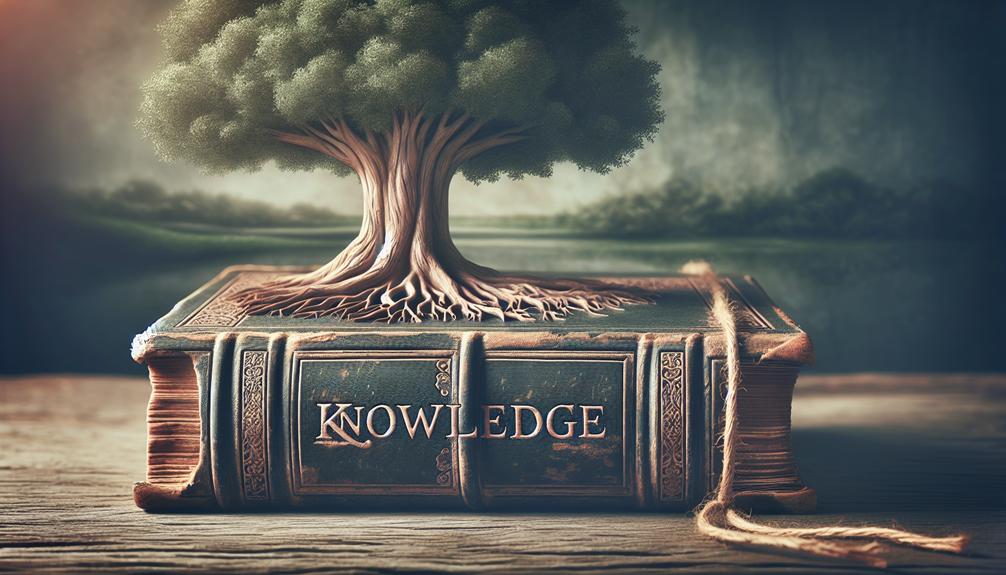What Is the Difference Between Knowledge and Wisdom in the Bible
Did you know the Bible mentions knowledge more than 150 times and wisdom over 200 times? Both Knowledge and Wisdom hold significant importance within the biblical context.
However, have you ever wondered what sets them apart?
What is the difference between Knowledge and Wisdom in the Bible?
The difference between knowledge and wisdom in the Bible is that knowledge is the accumulation of facts and understanding about a subject, while wisdom is the ability to apply knowledge discerningly and practically. True wisdom begins with the fear of God, which is the reverence and knowledge of God. According to biblical teachings, this distinction is essential for a fulfilling and righteous life.
This discussion will explore the distinctions between knowledge and Wisdom in the Bible and why understanding these differences can profoundly impact our lives.
So, let’s embark on this enlightening journey together and uncover the true essence of knowledge and Wisdom in the scriptures.
When I was younger, as I started to read the Bible, I gained a lot of knowledge on how God wants me to live my life, and through applying what I was taught in the Word of God, I gained wisdom.
Key Takeaways
- Knowledge is the accumulation of facts and understanding about a subject, while Wisdom is the ability to apply knowledge discerning and practically.
- True Wisdom begins with the fear of God, which is the reverence and knowledge of God.
- Knowledge without the message of Wisdom can lead to pride and arrogance, whereas true Wisdom comes from a deep understanding of God and His ways.
- Knowledge provides a foundation for faith, empowers believers to make informed decisions, helps discern right from wrong, equips believers for service and ministry, and enables effective witness and teaching.
- On the other hand, Wisdom provides guidance and discernment in decision-making, enables individuals to make sound choices based on Understanding, and goes beyond mere knowledge as it involves the application of knowledge aligned with God’s principles.
Difference Between Knowledge and Wisdom in the Bible

When understanding the difference between knowledge and Wisdom in the Bible, it’s important to establish clear definitions for each term.
Some might think this is no big deal, not knowing the difference, but it is.
You need to know how to use them in any given situation. The Bible is where we can access information on this topic. If you want Wisdom, know the Bible is where you must turn.
When I feel fearful, I look at what the Bible says about fear.
The beginning of knowledge starts and ends with the Bible. It’s in the Bible where you see the Wisdom of God.
Knowledge can be defined as the accumulation of facts, information, and understanding about a particular subject. In the Bible, knowledge is often associated with the pursuit of truth and the acquisition of information. More and more people today are in the rat race in the pursuit of knowledge.
My people are destroyed for lack of knowledge
Hosea 4:6
On the other hand, Wisdom goes beyond great knowledge. It’s the ability to apply knowledge in a discerning and practical way. True Wisdom, according to the Bible, begins with the fear of the Lord, which is the reverence and knowledge of God.
Biblical Wisdom isn’t just about intellectual Understanding; it includes moral discernment and the ability to make righteous choices. It’s the practical application of knowledge in ways that align with God’s will and purpose. Some people have a lot of knowledge, but they lack Wisdom.
Our Heavenly Father wants us to have both knowledge and Wisdom.
In essence, knowledge without Wisdom can lead to pride and arrogance, but true Wisdom comes from a deep understanding of God and His ways, which results in a life that’s pleasing to Him.
Some think their wise friends are those with higher school grades, but do they have the gift of knowledge and the Spirit of Wisdom according to the Bible?
Those are Spiritual Gifts that come from God.
Biblical Descriptions of Knowledge and Wisdom
To further explore the difference between knowledge and Wisdom in the Bible, let’s now delve into how these concepts are described in biblical texts.
The fear of the Lord is often emphasized as the beginning of Wisdom and knowledge. This fear isn’t terrifying but rather a reverential awe and respect for God. It’s understanding that God is all-knowing and recognizing our limitations in comparison.
The Holy Spirit plays a crucial role in acquiring knowledge and Wisdom. In the book of John, Christ Jesus promises to send the Holy Spirit as a helper who’ll guide believers into all truth. The Holy Spirit teaches and enlightens, enabling individuals to gain spiritual insight and Understanding.
The Word of God is another vital component in pursuing Wisdom and knowledge. The Bible describes it as a lamp to our feet and a light to our path. Through studying and meditating on God’s Word, we gain Wisdom and Understanding of His ways.
Proverbs 2:4-5 urges us to search for Wisdom as if searching for hidden treasures. It’s a continuous journey of learning, growing, and applying what we learn.
Collection of Bible Verses about Knowledge and Understanding
Proverbs 2:6 (NIV): “For the Lord gives wisdom; from his mouth come knowledge and understanding.”
Proverbs 3:13 (NIV): “Blessed are those who find wisdom, those who gain understanding.”
Proverbs 4:7 (NIV): “The beginning of Wisdom is this: Get Wisdom. Though it cost all you have, get Understanding.”
James 3:17 (NIV): “But the wisdom that comes from heaven is first of all pure; then peace-loving, considerate, submissive, full of mercy and good fruit, impartial and sincere.”
Colossians 1:9 (NIV): “For this reason, since the day we heard about you, we have not stopped praying for you. We continually ask God to fill you with the knowledge of his will through all the Wisdom and Understanding that theSpiritt gives.”
These verses emphasize the importance of seeking Wisdom and Understanding as gifts from God and highlight their value in leading a righteous and fulfilling life.
Value and Importance of Knowledge in the Bible

Knowledge holds immense value and plays a crucial role in the lives of believers, as emphasized in the Bible. The Bible highlights the importance of knowledge in several passages, encouraging believers to seek Understanding and gain Wisdom.
From a spiritual standpoint, knowledge serves as a foundation for faith. By gaining knowledge of God’s Word, believers can deepen their Understanding of His character and promises, strengthening their trust in Him.
On a personal level, knowledge empowers believers to make informed decisions and discern right from wrong. It guides their actions and helps them align their lives with God’s will. Lastly, knowledge has practical implications as it equips believers for service and ministry.
By gaining knowledge of the Bible, believers can effectively share the Gospel, teach others, and serve their communities.
Today, I am asked to share my wisdom by sharing what I learned through studying God’s Word.
I share my wisdom on Sundays and Fridays with the Youths in our Church.
Value and Importance of Wisdom in the Bible
Wisdom holds significant value and plays a crucial role in the lives of believers, providing guidance and discernment in decision-making. Good judgment is a fundamental aspect of Wisdom, enabling individuals to make sound choices based on their understanding of right and wrong.
In the Bible, a wise man is described as someone who seeks the right use of knowledge and applies it to do the right thing. Wisdom goes beyond mere knowledge; it’s the ability to apply knowledge that aligns with God’s principles and leads to righteous actions.
The value of Wisdom in the Bible is emphasized through various passages.
Proverbs 4:7 states, ‘Wisdom is the principal thing; therefore get Wisdom. And in all, you’re getting, get Understanding.’
This verse highlights the importance of actively pursuing Wisdom and Understanding.
Proverbs 9:10 further emphasizes the significance of Wisdom, stating that ‘The fear of the Lord is the beginning of wisdom, and the knowledge of the Holy One is understanding.’
This implies that true Wisdom comes from a respectful relationship with God and a deep understanding of His ways.
Having Wisdom allows believers to navigate through the complexities of life with clarity and discernment. It enables them to make decisions that honor God and benefit themselves and others.
The Bible encourages believers to seek Wisdom, knowing it’s a precious and invaluable asset in their faith journey.
Developing and Cultivating Knowledge and Wisdom in Our Lives

To grow in Wisdom and knowledge, engaging in learning and seeking Understanding actively is essential. The Bible emphasizes the importance of developing and cultivating knowledge and Wisdom in our lives.
Sad to say, but a lot of Church people suffer from a lack of knowledge, and they lack Understanding.
A wise person goes after knowledge and Understanding.
Knowledge refers to the accumulation of facts, information, and skills, while Wisdom is the ability to apply that knowledge in a wise and discerning manner.
Developing knowledge requires a thirst for learning and a commitment to seeking knowledge. It involves studying, reading, and exploring different subjects to expand our Understanding.
The Bible encourages us to ‘get wisdom; get insight’ (Proverbs 4:5) and to ‘apply your heart to instruction and your ear to words of knowledge’ (Proverbs 23:12).
By actively pursuing knowledge, we can better understand ourselves, the world, and the truths in God’s Words.
The wise men of Israel, such as Solomon and Jesus Christ, were after these things.
Solomon had a long life because of his wisdom.
You don’t have to go to Bible School to get these traits.
The Spirit of the Lord can help you acquire these things.
Cultivating Wisdom goes beyond mere knowledge. It involves the right application of knowledge in practical situations and making wise choices. Cultivating Wisdom also involves seeking guidance from others who are wise and experienced, as well as reflecting on our own experiences and learning from them.
Frequently Asked Questions
How Does the Bible Define Knowledge and Wisdom?
In the Bible, knowledge is the acquisition of information. At the same time, Wisdom is the application of that knowledge in a way that aligns with God’s principles and brings about true Understanding and discernment.
Can Knowledge and Wisdom Be Acquired Through Personal Experiences?
Yes, knowledge and Wisdom can be acquired through personal experiences. By actively engaging in life, reflecting on your actions, and seeking guidance from God, you can gain valuable knowledge and apply it wisely.
Are There Any Biblical Examples of Individuals Who Possessed Both Knowledge and Wisdom?
There are biblical examples of individuals who possessed both knowledge and Wisdom. They understood facts and information and applied discernment and Understanding to make wise decisions like Solomon.
Can Knowledge and Wisdom Be Obtained Through Formal Education?
Yes, knowledge and Wisdom can be obtained through formal education. Formal education provides expertise, while Wisdom is gained through applying and understanding that knowledge in real-life situations.
How Can One Effectively Apply Knowledge and Wisdom in Their Daily Lives According to the Bible?
In your daily life, you can effectively apply knowledge and Wisdom according to the Bible by seeking Understanding, making wise choices, and living in alignment with God’s commands.
Conclusion
In conclusion, the Bible highlights the difference between knowledge and Wisdom.
Knowledge refers to the accumulation of information, while Wisdom involves the application of that knowledge in a wise and discerning manner.
Both knowledge and Wisdom are valued and important in the Bible, as they contribute to a person’s Understanding and ability to make wise choices.
According to biblical teachings, cultivating and developing knowledge and Wisdom are essential for a fulfilling and righteous life.







